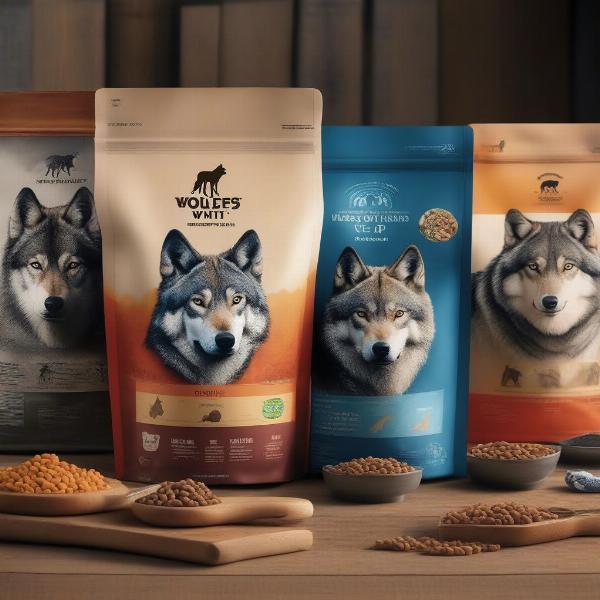Dog food with wolf imagery, branding, or ingredients often piques the interest of owners seeking a connection to their dog’s wild ancestry. But what’s the reality behind these products? This article delves into the world of “dog food with wolf,” exploring the marketing tactics, nutritional considerations, and what you should know before choosing a food for your canine companion.
Decoding the “Wolf” in Dog Food
Many dog food brands utilize wolf imagery and terminology to evoke a sense of wildness and natural power. However, this marketing doesn’t necessarily translate to a diet that’s truly beneficial for your domesticated dog. While dogs share a common ancestor with wolves, their nutritional needs have diverged significantly over thousands of years of domestication. A diet formulated for a wolf, a wild carnivore, is not necessarily optimal for a dog, which has adapted to thrive on a more varied diet.
 Dog food packaging with wolf imagery
Dog food packaging with wolf imagery
Nutritional Needs of Dogs vs. Wolves
Wolves primarily consume whole prey, including muscle meat, organs, bones, and some plant matter from the digestive tracts of their prey. This diet provides a specific balance of nutrients tailored to their high-energy lifestyle and physiological needs. Dogs, on the other hand, have evolved to digest and utilize carbohydrates more efficiently than their wild counterparts. A balanced dog food should provide a mix of protein, fats, carbohydrates, vitamins, and minerals to meet their specific requirements.
What to Look for in Dog Food
Instead of focusing on the “wolf” aspect, prioritize choosing a dog food based on your dog’s individual needs, including age, breed, activity level, and any health conditions. Look for food that meets the nutritional guidelines established by organizations like the Association of American Feed Control Officials (AAFCO). The AAFCO label ensures the food provides complete and balanced nutrition for your dog’s life stage.
Ingredients to Consider
- High-quality protein sources: Look for specified meat sources like chicken, beef, lamb, or fish, rather than generic terms like “meat meal.”
- Healthy fats: Essential fatty acids support skin and coat health.
- Digestible carbohydrates: Sources like brown rice, sweet potatoes, and oats provide energy.
- Avoid fillers: Ingredients like corn, wheat, and soy can be difficult for some dogs to digest.
The Myth of the “Wolf Diet” for Dogs
While some proponents advocate for feeding dogs a raw diet mimicking a wolf’s natural prey, this can be risky and nutritionally unbalanced unless carefully formulated by a veterinary nutritionist. Raw diets carry the risk of bacterial contamination and potential nutritional deficiencies if not properly balanced. Always consult your veterinarian before making significant changes to your dog’s diet.
Conclusion
While the allure of “dog food with wolf” is understandable, it’s important to make informed decisions based on your dog’s actual needs. Focus on selecting a high-quality, balanced diet that meets AAFCO standards and is formulated for your dog’s specific life stage and health conditions. Consult your veterinarian for personalized dietary recommendations to ensure your canine companion receives optimal nutrition.
FAQ
- Does “dog food with wolf” mean it contains wolf meat? No, most dog foods marketed with wolf imagery do not contain wolf meat.
- Is a raw diet better for my dog because it’s closer to what a wolf eats? Not necessarily. Raw diets can be risky and require careful planning to ensure nutritional balance.
- How can I tell if a dog food is high-quality? Look for AAFCO statements, specified meat sources, and avoid fillers.
- Should I choose a dog food based on breed? Breed-specific formulas can be helpful, but consider your dog’s individual needs.
- What if my dog has allergies or sensitivities? Consult your vet for recommendations on hypoallergenic or limited ingredient diets.
- How often should I change my dog’s food? Only change your dog’s food gradually and with veterinary guidance, unless there’s a specific health reason to do so.
- Where can I find more information on dog nutrition? Your veterinarian and reputable online resources like ILM Dog are excellent sources of information.
About ILM Dog
ILM Dog (ilmdog.com) is a leading online resource for dog owners worldwide, dedicated to providing expert advice and practical tips on all aspects of dog care, including breed selection, health, training, nutrition, grooming, and much more. We are passionate about helping you provide the best possible care for your furry friend. For personalized advice and support, contact us at [email protected] or call +44 20-3965-8624.